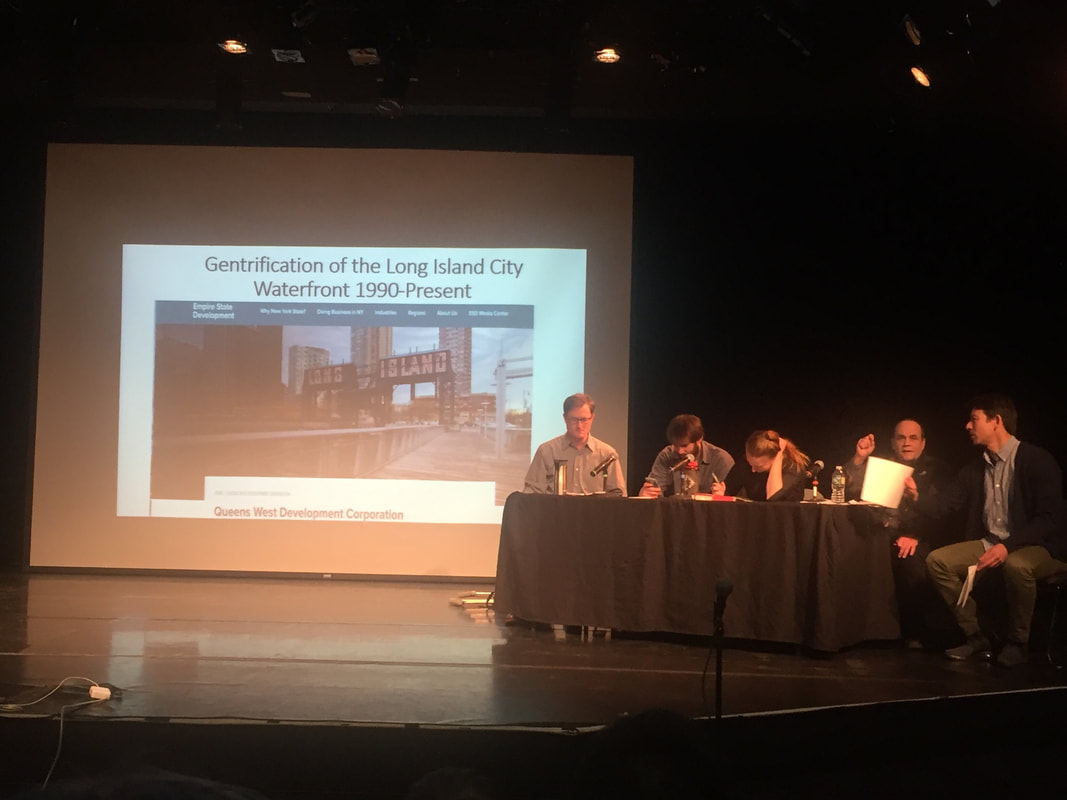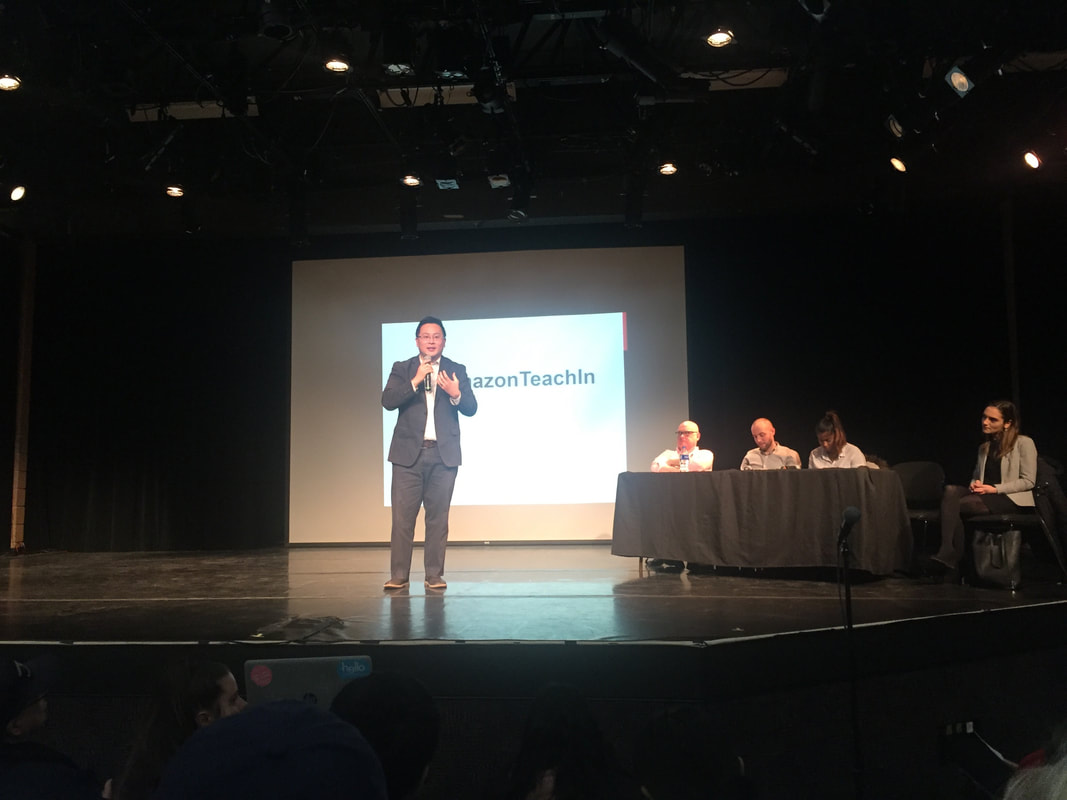Notes on the LaGuardia Community College Amazon Teach-In
By Molly Rosner
Molly Rosner works at the LaGuardia and Wagner Archives at LaGuardia Community College. The piece below, and any opinions expressed within, do not represent the Archives or the College’s point of view.
On November 13, 2018, Amazon announced that Long Island City would become the site for its new headquarters “HQ2” along with a site in Crystal City, Virginia. Since then, New Yorkers have greeted this announcement with both applause and outrage. Throughout the year, Amazon has received bids from cities and towns across the country trying to entice the trillion-dollar company to their area. But after the gimmicks and tax incentives have all been weighed, it feels clear that New York was always high on the list of places the company was considering.
Reactions have been swift and dramatic. LaGuardia Community College, in Long Island City, added a note to its website that reads, “We’re very proud that LaGuardia was a key player in the proposal process to bring Amazon here, and New York Governor Andrew Cuomo has said that LaGuardia’s diverse and talented students were a big plus for LIC.” The President of LaGuardia Community College, Gail Mellow, posted an open letter on the college website welcoming the company and saying, “we’re ready for Amazon to make a commitment to education and workforce training in Long Island City, and are ready to support Amazon in Queens as its educational partner.”At the same time others, including professors at the college, have expressed concern about how Amazon’s presence in the area will impact the already burdened infrastructure and transportation system.
Image from LaGuardia Community College's website.
In Long Island City, real estate speculation immediately skyrocketed in response to the announcement, seeming to confirm widespread concern about housing scarcity and instability for long-time residents. LaGuardia Community College sits amidst this historic debate and professors and activists moved quickly to voice their concerns, educate the student body, and galvanize action against the tech giants’ move.
The theater at LaGuardia Community College was packed from the first session of the teach-in until the last. It opened with the note that the concept of teach-in began with university students during the Vietnam War, which helped impress the weight of this historic moment. There were three one-hour sessions that featured 4-5 speakers each, with some notable politicians and their representatives in attendance.
First Panel of the Teach In at LaGuardia Community College. Photo by author.
The first session was moderated by Filip Strawbowski, who opened the day with a flood of impressive statistics. He noted that Amazon as a company is more than a marketplace for consumer goods; it markets in logistics. He then laid out some basics: Amazon is valued at $1 trillion dollars, its founder and CEO Jeff Bezos is the richest man in the world with an estimated net worth of $166 billion, 55 percent of online shopping searches start on Amazon, half of the households in the United States have Amazon Prime memberships, and 1 of every 2 dollars spent online is captured by Amazon. Amazon owns other large companies including IMDB, Twitch (a live streaming video platform), Zappos, Audible, Goodreads, Wholefoods, and the Washington Post. Strawbowski noted that the value of Amazon’s platform increases with every new user, because the more shoppers there are, the more vendors feels they need to be listed on Amazon. He cited Amazon as a venue for data extraction and predatory pricing, sharing that Amazon loses $1 billion a year on shipping costs through Prime but in doing so locks customers in to using them and penalizes those without memberships with delayed or cancelled shipping. He concluded, “Amazon is not just expanding within the market, it is becoming the market.”
The panel consisted of four speakers who had very different roles in the local community. First up was Steve Lang, professor of sociology at LaGuardia Community College, who talked about the gentrifying waterfront of Long Island City and the other big plans for the area, like Sunnyside Yards. He reported that Governor Cuomo had joked about renaming Newtown Creek, the polluted waterway between Brooklyn and Queens, the Amazon River and a few members of the audience laughed uncomfortably. Amazon will build around Anable Basin, a small inlet that was previous slated to be a mixed-income community with a proposed 5,000 new apartments, a quarter of which would be dedicated as affordable housing units. Lang spoke of Mayor de Blasio’s press conference about the Amazon deal, where he stated that there is “extraordinary synergy” with Queensbridge Housing project --the nation’s largest public housing project--which sits directly next door to the proposed Amazon HQ2 location. Meanwhile, NYCHA is in crisis, with inadequate funding and significant maintenance costs.
Celia Weaver, Policy and Research Director for New York Communities for Change, made it clear that choosing to give tax breaks and incentives to Amazon was a political decision that means choosing not to fund measures to alleviate the city’s housing crisis. Queensbridge Houses need $900 million in capital upgrades, and the governor and mayor have not invested in NYCHA. Rent-stabilized households have been under attack for years, with their numbers dwindling. Since Amazon’s announcement, brokers have begun offering buyouts to these tenants. Weaver asked, “who are we choosing to assist when we assist Amazon?”
Josh Kellersman, Director of Public Policy at the Retail Wholesale Department Store Union, spoke about the jobs that have been promised in this deal and the reality of employment by Amazon. He said that many of the 25,000 jobs will be blue collar warehouse jobs, not the high-paid tech jobs that are being cited in the news. His union opposes subsidies to private companies and feels that Amazon is a deadly and dehumanizing place to work. He noted that it has the highest turnover rate of any Fortune 500 company. A scathing report in the UK stated that three-quarters of Amazon’s warehouse workers were afraid to take bathroom breaks. Amazon has unstable scheduling which means workers cannot plan their lives around work and the company trains managers to recognize and stop workers from unionizing. The online retailer threatens brick and mortar retail jobs and the jobs in their warehouses are notorious for horrific labor practices that have led in the past to worker deaths.
Jake Streich-Kest of the Alliance for a Greater New York, closed the first session on the topic of jobs as well. He pointed out that 60 percent of tech workers in New York City are male, and 62 percent are white. Despite the Mayor’s claim of “extraordinary synergy” with Queensbridge housing, Streich-Kest emphasized, the 25,000 jobs that Amazon is promising are not going to benefit the average New Yorker and job fairs are empty promises, they can hold as many job fairs as they want but that will not train residents of Queensbridge in computer programming.
Professor of Sociology and Geography Arianna Martinez and current LaGuardia Community College student LJ Williams spoke about the how housing insecurity that so many New Yorkers and LaGuardia Community College students already face will be exacerbated by Amazon’s move. Martinez noted that you can purchase items from Amazon and still resist this move, taking a poll of how many Amazon Prime members were in the audience. What came as a shocking revelation to many was Amazon’s contract with Immigration and Customs Enforcement (ICE). By selling and encouraging the use of controversial facial recognition technology, she argued, Amazon is a company profiting from business with an agency that many CUNY students feel threatens them and their families.
Far Left, LJ Williams talks about housing insecurity, middle, Prof. Arianna Martinez. Photo by author.
Jonathan Baily of the Democratic Socialists of America, Queens Chapter, spoke to the injustice of giving the largest handout to the wealthiest person in the world. Stephen Petrus, an historian at the LaGuardia and Wagner Archives, pointed out that the city, since the 1980s, has relied increasingly on neoliberal economic practices and contracts with private investors, which often means disinvestment in public services that the city relies on. Bettina Damiani of the CUNY School of Labor and Urban Studies talked about other examples of public land being turned over to private developers, including Yankee Stadium, which took over a public park and the Citigroup building in Long Island City. Amy Herzog, Professor of Media Studies at Queens College, closed the second session with a deeper look at the company’s involvement with ICE and asked what it means to call New York a sanctuary city while courting a company like Amazon.
By the final session, a number of politicians had arrived to discuss their stance against Amazon. Julia Salazar, a young State Senator-elect from Brooklyn, Ron Kim, New York State Assembly member from Queens, and a representative for Alexandria Ocasio-Cortez all spoke. Salazar talked about the billions of dollars owed to New York City public schools and noted that this deal had bypassed the Land Use Review procedure. Kim spoke about the outrage he felt that three white men negotiated this deal without the input of their constituents and governing entities like the City Council and the State Assembly.
Assembly Member Ron Kim from Queens addresses crowd at Amazon Teach-In at LAGCC. Photo by author.
Doug Howard, a journalist for Behind the News, explained that the jobs that would come to New York would look like a bar bell – heavy on the ends with low and high wage jobs. Realistically, he said, these high wage jobs were going to go to MIT graduates, not LaGuardia Community College grads. As the day progressed the urgency of this moment became more palpable, and questions from students and faculty focused primarily on “what can we do?” and speakers gave some answers. Sabrina Jalal of CAAAV Organizing Asian communities told the audience about an upcoming teach-in at Queensbridge houses and noted the fears that Amazon’s new headquarters would add to the displacement and gentrification already taking place in Long Island City. Zach Lerner, Senior Director of Labor Organizing at NY Communities for Change, stated that Amazon had always intended to come to a city like New York and simply wanted to best deal possible. He said “Cuomo and de Blasio got played,” and got the crowd chanting “GTFO Amazon has got to Go” and told us to text “noamazonnyc” to 52886 for more information on how to get involved. He noted that the Public Authority Control Board needs to approve the subsidies and their vote had to be unanimous so the deal, or at least the large public subsidy, could still fall through.
Since the Teach-In more action has taken place at the school. On Monday, December 3rd, the doors below the archives were fitted with metal detectors and police (in addition to regular school security) for a CUNY Board of Trustees meeting scheduled for that afternoon. Outside the entrance a small but vocal group of students, organized by Brooklyn College, gathered to chant anti-Amazon slogans such as, “Amazon works with I.C.E. / That Doesn’t Jive with L.I.C.” and “Amazon is a scam / It’s Time CUNY gives a damn.” The protesters highlighted the conflict between the priorities of the CUNY Board of Trustees and the CUNY student body.
Protesters at Van Dam Street Entrance to LaGuardia Community College. Photo by author.
The primary takeaway of the Teach-In was that community voices needed to be heard and included in the discussion and so far, they have not. Members of City Council, local activists, teachers, and students continue to push for more transparency about the deal with Amazon and to galvanize a contingent of people to continue resisting the plan.
Molly Rosner is Assistant Director of Education Programs at the LaGuardia and Wagner Archives, and an editor at Gotham.




